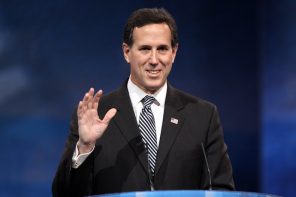Rick Santorum captured his party’s ugly mood on immigration last night when, in response to a question about how it could attract Latino voters, he said that Rick Perry’s support for in-state tuition for children of undocumented immigrants was an effort to attract “illegal — I mean Latino voters.” The Tea Party audience booed Perry when he reiterated his support for the Texas law, known as the Texas DREAM Act.
Perry, as well as the other candidates, refused to endorse the federal DREAM Act, which languishes in Congress and would, if passed, provide a path to citizenship for children of undocumented immigrants who pursue higher education or join the military. The House passed it last year, but Republicans fillibustered it in the Senate.
As I wrote last year, Republican legislators covered up their ears in the face of support for the federal DREAM Act by a coalition of conservative evangelical and Catholic leaders. This is one issue on which evangelicals are apparently helpless to move the GOP. What Santorum said demonstrates why: they know they need Latino votes to win elections, but they think of them as “illegal.”
Perry gets this, I am sure, and gets that religious leaders want to see immigration reform, even though he falls into line with his party on opposing the comprehensive kind. In 2008, Mike Huckabee, considered by many Arkansas Republicans to be a RINO (Republican In Name Only), was deemed by some to be too soft on immigration during his tenure as governor. That wasn’t the only factor that sank his candidacy, and it probably won’t be Perry’s either, if his bid for the nomination fails.
At Perry’s prayer rally The Response, there was not only considerable diversity in the crowd, but considerable praying in Spanish from the stage. One of the endorsers of The Response was the Rev. Samuel Rodriguez of the National Hispanic Christian Leadership Conference, who in 2008 told me, “Hispanic evangelicals overall will have to decide whether they can vote for McCain-Palin in spite of the nativism, xenophobia, and quasi-racist elements embedded in the Republican Party.” If that’s not a loud and clear message, I don’t know what is, but it just shows that despite the fact that much of the evangelical leadership gets this problem, and is struggling to signal it to the Party, those nativist elements within it mystifyingly maintain sway.
There’s a divide within the religious right, not just within the GOP, over whether to support immigration reform. Rodriguez is part of a powerbroker-heavy conservative coalition that supports comprehensive immigration reform, but not if it includes equality for bi-national gay and lesbian couples.
Those religious leaders are looking in their pews and seeing the writing on the wall (and what they believe may be future generations of culture warriors). The GOP is not.



